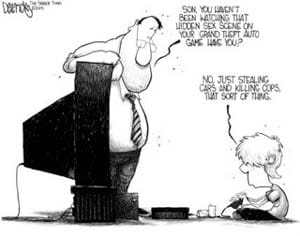By Andrew Tatusko
This is Part III in an on-going series on The Changing Church at the Mainline Protestant Portal.
 A 2007 report revealed that insurance companies cover about 260 sexual abuse cases from Protestant churches every year. The Catholics have had all the press with this issue not only because it runs so deep but because it was revealed that they were fully aware of the sex abuse and pedophilia issues among priests for years. The issue for them has gone global and is clearly bigger than we thought it was. For years the Church covered it up rather than expose it and thus lance the boil that had been forming on the souls of countless parishioners over the years. To that end, there has still not been a constructive and consistent forum for people to talk through the issues with the church, and it continues to get swept under the rug.
A 2007 report revealed that insurance companies cover about 260 sexual abuse cases from Protestant churches every year. The Catholics have had all the press with this issue not only because it runs so deep but because it was revealed that they were fully aware of the sex abuse and pedophilia issues among priests for years. The issue for them has gone global and is clearly bigger than we thought it was. For years the Church covered it up rather than expose it and thus lance the boil that had been forming on the souls of countless parishioners over the years. To that end, there has still not been a constructive and consistent forum for people to talk through the issues with the church, and it continues to get swept under the rug.
Rather than the issue being openly discussed in pastoral and theological terms, we continue to hear the issue within a context of lawyers and lawsuits and litigation along with payoffs. It is as if a little cash from the Vatican coffers will heal the problem. Protestant churches have a similar or identical issue in many of their congregations but with less press. This is clearly not a new issue, just one approached differently in the bounds of a different church polity. Are these issues of abuse and sexual dysfunction symptomatic of a deeper theological problem in Christianity in general?
 Maybe the issue is that Christians seem only to engage sex as a topic of what not to do rather than the nature of sex itself. Christians celebrate babies but do not celebrate the sexual union to produce them. If we cannot talk about sex on that most basic level, discussing it as a necessary and natural act between people who literally become one by doing it never crosses our language and social taboo barriers. We simply do not have a sophisticated and deep enough understanding of sex as a natural human act. It is as fundamental to propagate the species as food, and as needed an expression of erotic love as a hug and a peck on the cheek. So it remains hidden and taboo among parishioners as something "inappropriate," as if a good and deep discussion about sex would necessarily result in debased pornography and immorality.
Maybe the issue is that Christians seem only to engage sex as a topic of what not to do rather than the nature of sex itself. Christians celebrate babies but do not celebrate the sexual union to produce them. If we cannot talk about sex on that most basic level, discussing it as a necessary and natural act between people who literally become one by doing it never crosses our language and social taboo barriers. We simply do not have a sophisticated and deep enough understanding of sex as a natural human act. It is as fundamental to propagate the species as food, and as needed an expression of erotic love as a hug and a peck on the cheek. So it remains hidden and taboo among parishioners as something "inappropriate," as if a good and deep discussion about sex would necessarily result in debased pornography and immorality.
Sex is as taboo in the churches as it is in our culture in general. The irony is that sexual behavior and desire is such a powerful message that the media uses it to entice the desire of a viewer or listener to consume goods such as music, cars, food, alcohol, movies, perfume, soft drinks, and, yes, video games. While this is more geared toward men, women must participate in the production of these messages in order to entice the men! In our consumer driven culture we act out our sexual inclinations on a regular basis, but when we try to discuss them in serious or personal contexts, we are embarrassed or we feel it is too shameful. It is such an odd paradox in our culture that it is baffling. We consistently act out our sexual desires as our culture permits, but we are not permitted to discuss these desires for reasons of taboo and arbitrarily demarcated private boundaries.
Any desire we have must have a place to bring that desire under rational understanding and proper direction. If sexual desire does not have a proper end it will run out of control to improper ends. Not talking through these desires leaves them unchecked and, thus, improperly guided and directed.
It should now be evident that there are indeed gay pastors and priests who are simply not allowed to have the forum to discuss their sexual desire. Thus these desires cause them daily pain because they cannot express them and so these desires find poor direction and release where it is convenient and quiet. Heterosexual pastors may also have the same issue with misdirected desire although they are allowed to be public with their relationships. Many more parishioners have the same set of problems due to the consistent strictures of our culture that do not allow us to articulate our sexual desires in concert with our theology and our relationship with God.
Seen this way, sex seems to be the very definition of dysfunction. People have problems and keep them hidden until moments of stress cause brief and sometimes permanent upheavals in relationships. Pastors and theologians need to do a much better job of not being afraid to discuss openly and honestly with adults and especially youth about desire and its role in our relationships. This is not in order to discuss the limits of sex -- there is enough material that tells us what not to do. What we need are better open and honest discussions of our deep-seated desires, which we probably have never discussed, in order to bring them under the guidance and purview of the Kingdom of God as lived in the midst of our brothers and sisters in the church. [Read an article on sex ed and youth ministry at Patheos here.]





